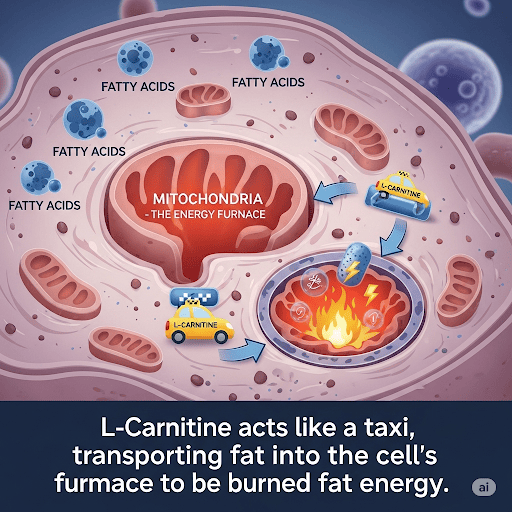For some pets, energy means fueling an explosive sprint across the park. For others, it’s the daily struggle to burn off excess pounds and maintain a healthy weight. The key to both of these scenarios—and everything in between—lies in how efficiently their body can turn fat into fuel.
There’s a special "helper" molecule that plays a starring role in this crucial process, but many pet owners have never heard of it. Its name is L-Carnitine.
This article will shine a spotlight on this powerful, vitamin-like compound. We'll explain what it is, how it supports a healthy metabolism, and which pets stand to benefit the most from its inclusion in their diet.
What is L-Carnitine and What Does It Do?
L-Carnitine is a compound made in the liver and kidneys from two amino acids, lysine and methionine. Its primary job is absolutely essential for fat metabolism in pets. To understand what does L-Carnitine do, it helps to use a simple analogy: think of it as a "fat taxi."
Inside every one of your pet's cells, there are tiny power plants or "furnaces" called mitochondria. This is where fuel is burned to create energy. Long-chain fatty acids—the kind that come from your pet’s food or their body fat—are an excellent source of dense energy. There's just one problem: they're too big to get into the mitochondrial furnace on their own.
This is where the L-Carnitine taxi service comes in. L-Carnitine picks up a fatty acid, "drives" it across the mitochondrial membrane, and drops it off inside the furnace where it can be burned for energy. It then drives back out to pick up another passenger. Without enough of these L-Carnitine taxis, fat cannot be used for energy efficiently, and the body will turn to other, less-dense sources instead.
Who Benefits Most from L-Carnitine?
While most healthy adult pets can produce enough L-Carnitine for their daily needs, certain conditions and life stages increase the body's demand, making dietary supplementation highly beneficial.
- Weight Management: This is the most common use for L-Carnitine for pets. For an overweight pet, a diet fortified with L-Carnitine helps improve the body's ability to burn its own fat stores for energy. Crucially, this helps preserve lean muscle mass during weight loss, which is vital for keeping their metabolism active.
- Athletic & Working Dogs: These canine athletes have enormous energy needs. L-Carnitine helps provide their hard-working muscles with a steady, efficient fuel supply from fat, which can improve stamina and aid in post-exercise recovery.
- Senior Pets: As pets age, their metabolism can slow down and they may begin to lose muscle mass (a condition called sarcopenia). Supplementing with L-Carnitine can help support their energy levels and maintain lean body mass.
- Heart Health: The heart is a muscle that never rests. It has incredibly high energy demands and relies heavily on fat for fuel. L-Carnitine is critical for normal cardiac function and is often included in therapeutic diets for pets with certain heart conditions.
Targeted nutrition can make a world of difference for these pets. Our meal planner app allows you to explore diets specifically formulated for different needs. You can easily find weight management or performance formulas that are fortified with beneficial ingredients like L-Carnitine, ensuring your pet gets the metabolic support they need built right into their daily meals.
L-Carnitine in Your Pet's Diet
L-Carnitine is found naturally in animal-based proteins, with the highest concentrations in red meats like lamb and beef. However, to get a therapeutic effect, it is often added to specific diets in a pure, supplemental form.
It's important to have realistic expectations. L-Carnitine is a powerful tool, but it is not a magic weight-loss pill. To be effective, especially for L-Carnitine for dogs weight loss, it must be part of a complete program that includes appropriate calorie control and regular exercise. L-Carnitine makes the process of burning fat more efficient; it doesn't replace the need for a healthy lifestyle.
(L-Carnitine is particularly useful in weight management plans. Learn more about setting up a plan in Calories in Pet Food: The Energy That Powers Your Pet.)

Conclusion: A Key to Unlocking Your Pet's Energy Potential
L-Carnitine is the essential "fat taxi" that diligently transports fat into the cellular furnace to be burned for energy. This vital role makes it a key player in maintaining a healthy metabolism, supporting the integrity of lean muscle, and properly fueling your pet’s body.
While not every pet needs extra L-Carnitine, it can be a nutritional game-changer for pets struggling with their weight, hardworking canine athletes, and seniors who need to maintain their strength.
Could your pet's metabolism use a boost? Talk to your veterinarian to see if a diet fortified with L-Carnitine is a good choice for their specific needs. Use our meal planner to discover foods that harness the power of this incredible nutrient to help your pet feel strong, lean, and full of life.


